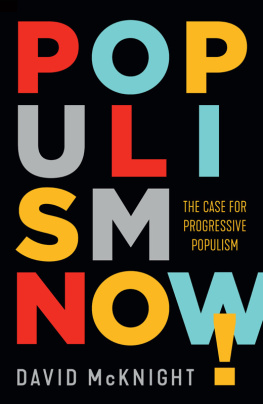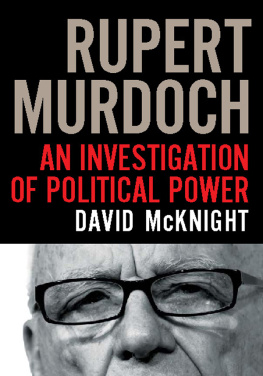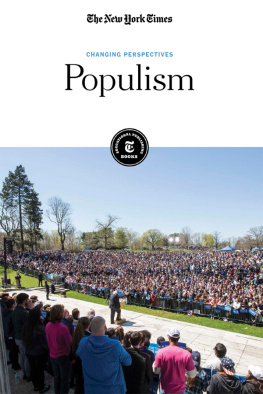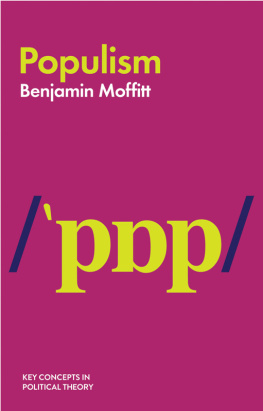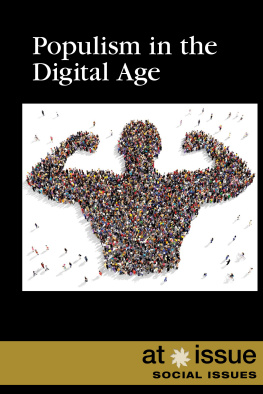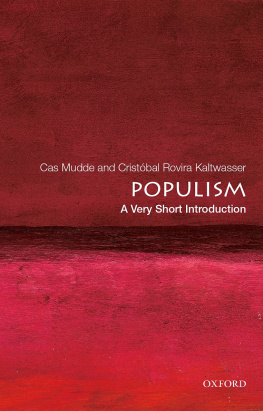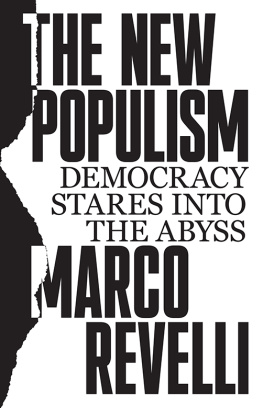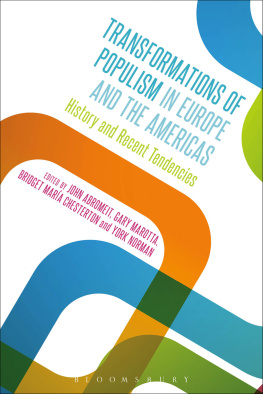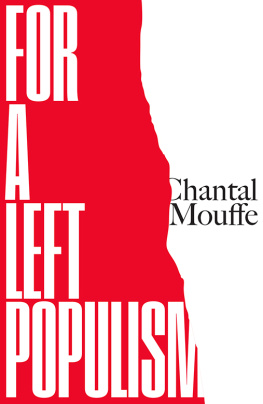David McKnight - Populism Now!: The Case For Progressive Populism
Here you can read online David McKnight - Populism Now!: The Case For Progressive Populism full text of the book (entire story) in english for free. Download pdf and epub, get meaning, cover and reviews about this ebook. year: 2018, publisher: University of New South Wales Press, genre: Politics. Description of the work, (preface) as well as reviews are available. Best literature library LitArk.com created for fans of good reading and offers a wide selection of genres:
Romance novel
Science fiction
Adventure
Detective
Science
History
Home and family
Prose
Art
Politics
Computer
Non-fiction
Religion
Business
Children
Humor
Choose a favorite category and find really read worthwhile books. Enjoy immersion in the world of imagination, feel the emotions of the characters or learn something new for yourself, make an fascinating discovery.
- Book:Populism Now!: The Case For Progressive Populism
- Author:
- Publisher:University of New South Wales Press
- Genre:
- Year:2018
- Rating:4 / 5
- Favourites:Add to favourites
- Your mark:
- 80
- 1
- 2
- 3
- 4
- 5
Populism Now!: The Case For Progressive Populism: summary, description and annotation
We offer to read an annotation, description, summary or preface (depends on what the author of the book "Populism Now!: The Case For Progressive Populism" wrote himself). If you haven't found the necessary information about the book — write in the comments, we will try to find it.
Populism Now!: The Case For Progressive Populism — read online for free the complete book (whole text) full work
Below is the text of the book, divided by pages. System saving the place of the last page read, allows you to conveniently read the book "Populism Now!: The Case For Progressive Populism" online for free, without having to search again every time where you left off. Put a bookmark, and you can go to the page where you finished reading at any time.
Font size:
Interval:
Bookmark:
POPULISM NOW!
DAVID MCKNIGHT is an honorary associate professor in the School of the Arts and Media at the University of New South Wales. He has worked as a journalist at the Sydney Morning Herald and Four Corners and has written or co-written many books including Big Coal: Australias dirtiest habit (NewSouth, 2013) as well as Rupert Murdoch: An investigation of political power (Allen & Unwin, 2012) and Beyond Right and Left: New politics and the culture war (Allen & Unwin, 2005). He co-edited (with Robert Manne) Goodbye to All That? (Black Inc, 2010). In 2012 he was the co-author of Journalism at the Speed of Bytes, a study commissioned by the Walkley Foundation for Journalism on the future of journalism in view of the crisis in newspapers business model.
He is also a historian of the Cold War and espionage, having written an authoritative history of Australias internal security, Australias Spies and Their Secrets (1994) and a history of the underground political tradition of the Communist International, Espionage and the Roots of the Cold War (2002).

A NewSouth book
Published by
NewSouth Publishing
University of New South Wales Press Ltd
University of New South Wales
Sydney NSW 2052
AUSTRALIA
newsouthpublishing.com
David McKnight 2018
First published 2018
10 9 8 7 6 5 4 3 2 1
This book is copyright. Apart from any fair dealing for the purpose of private study, research, criticism or review, as permitted under the Copyright Act, no part of this book may be reproduced by any process without written permission. Inquiries should be addressed to the publisher.

A catalogue record for this book is available from the National Library of Australia
ISBN 9781742235639 (pbk)
9781742244204 (ebook)
9781742248615 (ePDF)
Design: Josephine Pajor-Markus
Cover design: Luke Causby, Blue Cork
Printer: Griffin Press
All reasonable efforts were taken to obtain permission to use copyright material reproduced in this book, but in some cases copyright could not be traced. The author welcomes information in this regard.
This book is printed on paper using fibre supplied from plantation or sustainably managed forests.

CONTENTS
For Jane, companion, critic, comrade, collaborator. Always a source of wise advice.
And to the memory of Andrew Casey (19532018), a labour movement activist in both Australia and the world.
INTRODUCTION
Heres a quick quiz. What do the following political figures have in common: Pauline Hanson, Bill Shorten, Donald Trump, Jeremy Corbyn and Bernie Sanders?
Answer: all have been accused of populism. Whether theyve bashed banks, billionaires or boat people, theyve been damned as populists. Yet these political figures come from wildly different parts of the Left and Right. Can they all be populists?
Mostly, when I hear people damning someone as a populist, they are talking about a right-wing version. But its not that simple. In this book, I argue that a progressive version of populism exists too. A progressive populism takes up the genuine economic grievances of everyday Australians without scapegoating migrants or minorities in the way Donald Trump and the pro-Brexit forces have done. In fact, a progressive form of populism is the best way of defeating the racist backlash of right-wing populism because it addresses the social and economic problems which partly drive the rise of right-wing populism. As well, it asserts our common humanity, whatever diversity we also express.
I first discovered populism when I began teaching investigative journalism in the late 1990s at university. I had some understanding of the subject already, having worked on the ABCs investigative TV program Four Corners. Like other journalists, I knew about the role of investigative journalism in the Watergate scandal of the early 1970s. However, to teach it as an academic course I needed to know about its historical origins. I found that investigative journalism (originally called muckraking) began in the United States around 1900 during what Americans call the Progressive Era. It was called this because it was a period of radical ideas and activism about social reform. One expression of this was the emergence of a new political party, the Peoples Party, in 189091. It stood for the interests of ordinary people farmers and workers against the robber barons in the privately owned banking, oil and railway industries. Friends and enemies alike described the approach of the Peoples Party as Populism and its supporters as Populists.
The muckraking journalists were crusaders on issues which they shared with the Populists. For example, in his book The Jungle, writer Upton Sinclair exposed the dangerous and filthy conditions endured by the Chicago meatworkers. Years later his book was recognised as one of the forces behind the introduction of food safety laws. One of the first female muckrakers, Ida Tarbell, exposed the ruthless practices of Standard Oil in crushing rival companies in a series of articles published in McClures Magazine, and eventually a book, The History of the Standard Oil Company. Today, Standard Oil is better known as Exxon and remains a ruthless corporation. Lincoln Steffens book The Shame of the Cities exposed the corruption of political machines linked to gambling, prostitution and bribery. Other muckrakers attacked the role of big money in government and the power of Wall Street. Their journalism, I realised, was a key contribution to the progressive causes shared with the Populists.
The key idea of the Populists was that the interests of ordinary people were in conflict with those of the elite. Some of the Populists had conspiratorial ideas about money and power but their movement was a powerful challenge to aggressive, unregulated big business. Having been on the Left of politics since my teens, I found this history of a forgotten reform movement fascinating. Its goals of economic and social justice for ordinary people are still relevant today.
Years later I rediscovered American populism when I read a book by journalist Thomas Frank, Whats the Matter with Kansas? Published in the wake of the election of George W Bush, his book pointed out that Kansas, now a conservative Republican state, was once a centre of radical activity. One Kansas town produced a socialist newspaper, Appeal to Reason, which sold hundreds of thousands of copies. In the 1890s its farmers, driven to the brink of ruin by years of bad prices and debt, held huge meetings where Kansas radicals like Mary Elizabeth Lease urged the farmers to raise less corn and more hell. From this situation, the Peoples Party emerged as the enemy of the money power and as an alternative to both Democrats and Republicans. It advocated publicly owned railways and banks along with a progressive income tax on the rich. For this, Frank tells us, they were reviled for their bumpkin assault on free market orthodoxy.
In 2015 and 2016 I found myself hearing commentators talk about the rise of modern forms of populism during the looming US presidential election. Both Donald Trump and Bernie Sanders were referred to as populists. Sanders had opened his campaign with the statement: This country and our government belongs to all of us, not just a handful of billionaires. It was a modern echo of the progressive side of the American populist tradition. Although he didnt win the Democrats presidential nomination, Sanders shifted the political agenda and challenged the untrammelled power of the wealthy in the name of ordinary people.
Next pageFont size:
Interval:
Bookmark:
Similar books «Populism Now!: The Case For Progressive Populism»
Look at similar books to Populism Now!: The Case For Progressive Populism. We have selected literature similar in name and meaning in the hope of providing readers with more options to find new, interesting, not yet read works.
Discussion, reviews of the book Populism Now!: The Case For Progressive Populism and just readers' own opinions. Leave your comments, write what you think about the work, its meaning or the main characters. Specify what exactly you liked and what you didn't like, and why you think so.

